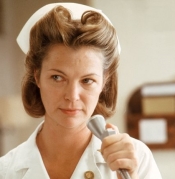Having watched both the (American) Democratic and Republican conventions a little each night, I found Clint Eastwood's improvised moment with the empty chair during the Republican convention to be the most compelling and meaningful part of the whole charade. But the pundits and critics, who claim to be ready for something authentic and substantive, finally got something that was just that, and they immediately rejected it.
Eastwood said he had cried when Obama was elected (presumably because it was such a powerful moment for a nation with a long history of racism). I take him at his word, and believe he was moved like so many others that night. So what was this moment with the chair all about?
Here's what: The chair was empty, signifying an absence, and speaking silence. This prompts the audience to wonder,
Where is the Barack Obama I voted for? Because I don't see him anywhere.
Eastwood begins a sort of pitiful dialog with the missing Obama. He is attempting to recreate a ghost, the faded remains of the projection of his own hopes and dreams from four years ago: "So, Mr. President, how do you handle promises that you have made when you were running for election, and how do you handle them? I mean, what do you say to people? Do you just, you know--I know people were wondering. You don't handle that. OK."
Soon the projection lashes out, judging by Eastwood's reactions: "But, I thought maybe as an excuse--what do you mean shut up?" Here, the projection has taken on a life of its own, and is no longer merely a canvas. The candidate Obama from 2008 is no longer a willing, cooperative partner in this game of imagination. The exercise dissolves, leading Eastwood to his moment of resignation: "And I think it's that time. And I think if you just step aside and Mr. Romney can kind of take over."
Eastwood is hardly a champion for Romney, though: "A stellar businessman. Quote, unquote, a stellar businessman." His talking points covered, sarcastically. Finally, in a turn away from the chair to the listening audience, Eastwood delivers his real message, one of disappointment and disillusion with the whole process: "And, so, they (the candidates) are just going to come around and beg for votes every few years. It is the same old deal." And then, "We don't have to be--what I'm saying, we do not have to be metal
masochists and vote for somebody that we don't really even want in
office just because they seem to be nice guys or maybe not so nice guys ... "
It's a shame the whole exchange was written off as crazy talk by a misguided old man. Eastwood attempted to inject a moment of truth and sincerity into an obscene display of delusion and dishonesty, but instead he was rejected and held up as proof that the rest of the display is coherent and the system works.
Notes:
- Eastwood badly misread or misunderstood his audience, who they were, and where they were coming from. He may have been misguided in several other ways, too, arguably, but his main point stands.
- His means of communicating was a little unorthodox, so for this reason, too, he was rejected.
 Most people probably know Jerry Orbach as the actor who played NYPD Detective Lennie Briscoe for 12 seasons on the long-running NBC crime drama "Law & Order." Orbach got into the habit of writing (by hand!) a poem to his wife every day. She saved them all and has had them published in this short volume. Looped in among the playful poems are personal anecdotes and biographic material shared by Elaine Orbach. This is a glimpse inside a genuinely affectionate marriage.
Most people probably know Jerry Orbach as the actor who played NYPD Detective Lennie Briscoe for 12 seasons on the long-running NBC crime drama "Law & Order." Orbach got into the habit of writing (by hand!) a poem to his wife every day. She saved them all and has had them published in this short volume. Looped in among the playful poems are personal anecdotes and biographic material shared by Elaine Orbach. This is a glimpse inside a genuinely affectionate marriage. 









